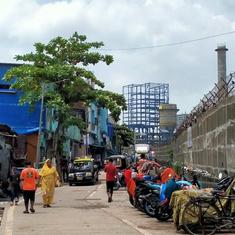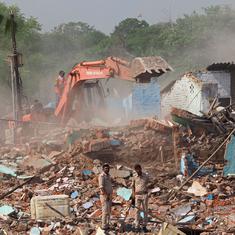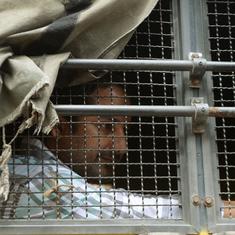At a meeting in Delhi, Tuki asked Singh to review the Centre’s move on March 27 to widen the ambit of the act to 14 of the state’s 21 districts.
The decision came as such a surprise, the state government is yet to receive the copy of the notification, said a senior official in the Arunachal capital of Itanagar. The ostensible reason for decision is the serious law and order problems in all districts of the state that border Assam.
AFSPA gives the armed forces extraordinary powers when they operate in areas that are designated as “disturbed”. It also gives the forces immunity from prosecution for their actions, leading to charges that it has allowed blatant human rights violations to go unpunished.
Initial notifications
Arunchalis are way of AFSPA because they have more than two decades of experience with how it could be misused. In 1991, the districts of Tirap and Changlang were put on in the "disturbed" list as a reaction to intensified activity by the two factions of the Nationalist Socialist Council of Nagalim. The groups are demanding a separate nation comprising three districts of Arunachal, all of Nagaland and the Naga-dominated areas of Myanmar. Londing, which was carved out of Tirap, was added to the "disturbed" list in 2012.
In addition, AFSPA already applied to areas falling within 20-kilometre radius in Arunachal Pradesh bordering Assam.
The Centre’s sudden decision to extend the areas under AFSPA has caught many Arunachal residents off-guard. Though the state is heavily militarised because it is on the international boundary with Tibet, Myanmar and Bhutan, Arunachal is considered a relatively peaceful states.
An MLA from one of the districts where AFSPA has been enforced said the move was illogical. “People of Tirap, Changlang and Londging have been suffering for decades now,” he said. “On one hand, the Army pick up anyone and torture them and on the other both factions of Nationalist Socialist Council of Nagalim have been running the show in three districts.”
All government departments in the area pay 2% of all developmental funds to NSCN separatists as an unofficial tax, the MLA claimed. “What does it say?” he asked. “The act has not stopped militancy but it is used as a tool to spread terror.”
More criticism
Congress legislator Pasang D Sona said that the decision sends out a bad signal. “It simply means that centre doesn’t trust the people of Arunachal,” he said.
Sunil Mow, a human rights lawyer in the state capital of Itanagar also emphasised that the decision will hurt the state. It “is not the solution to the law, order and security problems and it would only justify killing, torture and used as an excuse to terrorise people,” he said.
Already, civil society organisations, women’s as well as students organisations have strongly opposed the government move, describing it as the “murder of democrac”y.
“ AFSPA contravenes international human rights law and continued imposition of such act tantamount to systematic violation of indigenous peoples' rights and
encroaching upon the internal affairs of the state, and supersedes the sovereign and plenary powers of the state Government in the governance of its internal affairs such as law and order, and public order,” said a joint statement by a raft of civil society groups, including the Arunachal Citizens Right, All Arunachal Pradesh Students Union, Human Right & Law Network (Arunachal Chapter), Nefa Indigenous Human Right Organization and Arunachal Pradesh Women Welfare Society.
They added that there were several instances of the Army killing innocent people the three districts where AFSPA is already in force.
This isn’t the first time Arunachal residents have rallied against AFSPA. There have been innumerable representations and rallies against it over the past two decades. In 2007, the state legislature decided to act. Wanglin Lowangdong, an MLA from Tirap, moved a private member’s resolution to withdraw the Disturbed Areas notification for the state. It was passed unanimously. But when the decision was
communicated to the Ministry of Home Affairs, it met with absolute silence.
Targetting civilians
AFSPA has also meet with vociferous opposition in other parts of the North East, as residents claim that the act has been used to target civilians.
In February, the Centre rejected the Jeevan Reddy Commission Report which had recommended repealing AFSPA in the North East. The five-member commission had been appointed in 2004 to review the provisions of AFSPA in the North Eastern states.
The March 27 notification extending the act to more parts of Arunachal claimed that the state’s geographical terrain “puts the militants in advantageous position and is used by underground outfits as their safe heaven". The notification lists the presence of Nationalist Democratic Front of Bodoland, NSCN (Issac-Muivah), NSCN (Khaplang), ULFA, Kamtapur Liberation Organisation and the Manipur People’s Liberation Front along the Assam-Arunachal border.
AFSPA has been in force in Assam since 1990 when the Indian Army began crackdown on the United Liberation Front of Assam.










